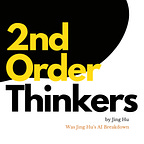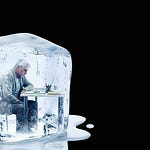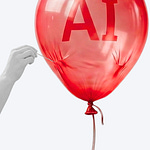AI Takes Home the 2024 Nobel Prizes
This year’s awards to AI pioneers have sparked debate. Should the Nobel Committee recognize computer science in 2025?
Just a few days ago, I was explaining how AlphaFold works to a friend. As a former biochemist, I know all too well how much time it has saved our fellow scientists in the research process.
I was genuinely amazed by how accessible and user-friendly the platform is.
After ten years away from the world of spending countless hours in the lab wrestling with protein cloning and purification, concentrating on protein solutions, and preliminary crystallization trials, until you reach X-ray crystallography analysis…
Using AI to predict protein structures felt like stepping into the future. Exploring AlphaFold made me appreciate the brilliance of AI's real application.
If you didn’t know yet, the 2024 Nobel Prizes in Physics and Chemistry have both honored pioneers in AI. This is a significant shift in how we recognize and value contributions to science and technology!
I’ve been following the news closely on the Nobel Prize. There are questions and disputes about whether AI researchers should receive the Chemistry or Physics Nobel Prize.
Personally, I fully appreciate the winners, but I also understand where the questions come from. And this is something I want to discuss here.
This article starts by highlighting the 2024 Prize winners and their contributions. Then, I want to discuss with you:
Should an AI researcher receive a prize in subjects like Physics and Chemistry?
Should there be a computer science prize instead?
Should AI be part of the research and judging process?
AI Pioneers Claim the Nobel Spotlight
The Nobel Prize in Physics 2024
First, a heartfelt congratulations to John J. Hopfield and Geoffrey E. Hinton on receiving the Nobel Prize in Physics.
Hopfield’s work on associative neural networks, known as the Hopfield Network, has been a cornerstone of AI research and has significantly influenced fields like molecular biology and neuroscience — areas that are particularly close to my heart. His insights into memory and data models have paved the way for the neural network architectures we rely on today as the cornerstone of current AI.
Geoffrey Hinton, often dubbed the “Father of Deep Learning,” has been instrumental in advancing neural network research. His work on backpropagation in the 1980s laid the groundwork for neural networks to learn and adapt, which is fundamental to today’s AI applications. I’m especially interested in his attitude toward the potential risks of AI and Sam Altman, a topic we could explore another day.
Without these two visionaries, we might not have ChatGPT to play with. What a scary thought ;)
If you’re interested in learning more, here’s my Perplexity page on why J. Hopfield and Geoffrey E. Hinton received the Nobel Prize in Physics.
Hinton’s reaction to winning was humble and amusing. When he got the call from the Nobel Prize, he suspected a scam:
My very first thought was, how could I be sure it wasn’t a spoof?
Then, the interviewer asked a question I think many people would like to know and the main topic I want to discuss here:
How would you describe yourself? Would you say you were a computer scientist or a physicist trying to understand biology?
Hinton’s reply:
I would say I’m somebody who doesn’t really know what field I am in, but would like to understand how the brain works… To understand how the brain works, I’ve got to create the technology that works surprisingly well.
The Nobel Prize in Chemistry 2024
The Nobel Prize in Chemistry was also awarded to AI researchers — David Baker for RosettaFold and Demis Hassabis and John Jumper for AlphaFold.
Here’s my Perplexity.ai page on why the Nobel Prize in Chemistry 2024 went to Baker and Hassabis.
AlphaFold, simply put, is a system researchers can use to predict the 3D structure of proteins from amino acid sequences — a task that was once complex and time-consuming.
How time-consuming are these tasks? To give you some idea:
Without AlphaFold, Determining a protein’s structure typically takes 4 to 8 months, sometimes longer. This includes Protein Production and Purification, Crystallization, Data Collection, Model Refinement, and Validation.
If you fail in any one of these steps, you have to try again. Ah… the good old days in the lab.With AlphaFold, Structures can be predicted in days, dramatically speeding up research and discovery.
You can read more about AlphaFold’s achievements on DeepMind’s press page.
Let’s use an example you likely have felt at some point: COVID.
During the early days of the COVID-19 pandemic, I remember reading about how DeepMind’s team released their predictions to help combat the virus. They accurately predicted the structures of several SARS-CoV-2 proteins, aiding researchers in understanding the virus better and accelerating the development of treatments and vaccines.












